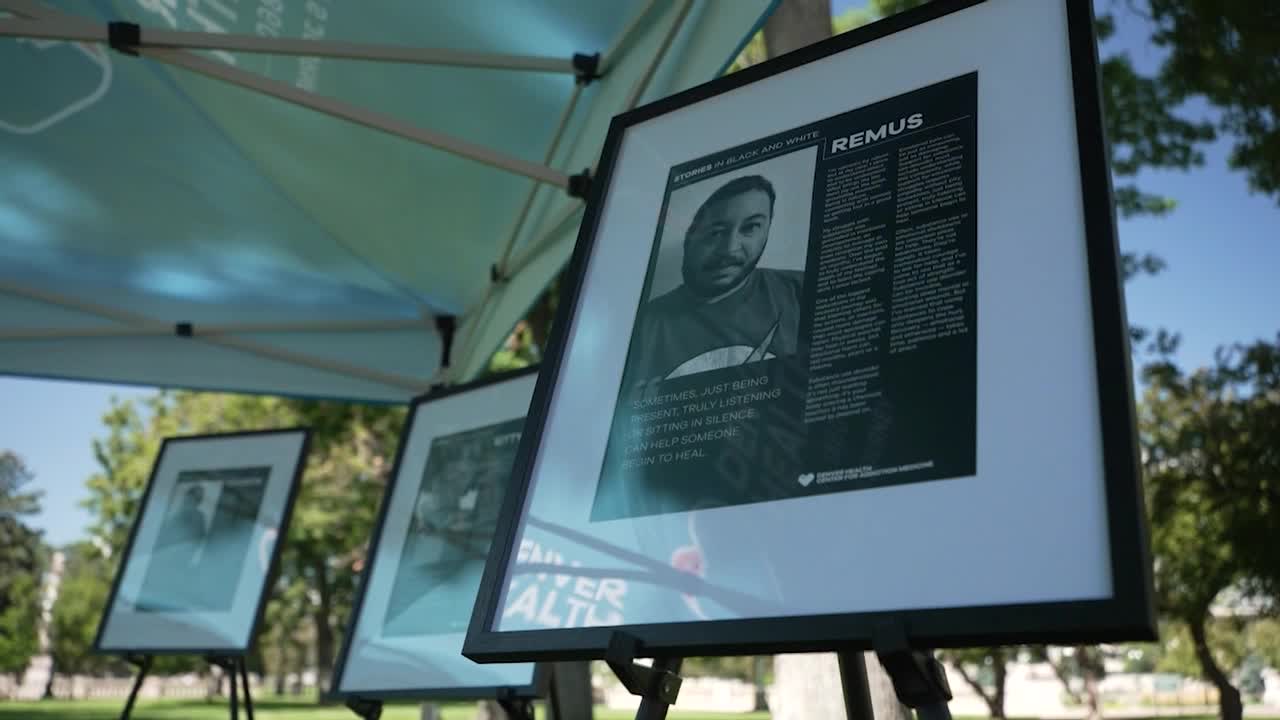DENVER — Denver Health is amplifying voices of hope throughout September as part of National Recovery Month. National Recovery Month celebrates the millions of people who are in recovery from substance abuse and mental health disorders.
Denver7 looked through data from the Denver Department of Public Health and Environment (DDPHE) and found Denver has confirmed 320 overdose deaths so far this year — 213 of them linked to fentanyl. That’s an increase from 275 deaths during the same period last year.
In response, Denver Health is presenting "Stories in Black and White," an exhibition featuring real-life accounts from those impacted by the opioid crisis. The project aims to combat stigma and encourage Coloradans to seek help.

Can a story help save a life?
For Vicente Garcia, sharing his journey through substance abuse — five attempts at rehab before finding lasting sobriety — puts his struggles and resilience on display as a beacon of light for others.
“I think they if they read this, this is my story. I've been in rehab five times,” Garcia said. Despite the repeated setbacks, he insists, “No matter how many times it takes when you're finally ready to do the work. Sobriety is possible.”
Remembering his own turning point, Garcia says, “It’s just I wasn't doing the work. And then when I did the work, you know, when I put my, you know, feet down and said, 'You know what, let's do it, you know. You’ve done this for fifteen years, give this [sobriety] a shot for five.'”
Garcia’s active pursuit of new experiences and milestones, like rafting and skydiving, highlight his renewed outlook on life.
“I learned to love myself today. I learned to give myself a hug. I was proud. I didn't love myself before, and now I do so, what you see is what you get!”
Finding strength in shared experiences
For Krystin Loera, her story is a testament that even those who feel beyond repair can change.
“I used to think addiction ruined me. Now I know it's the reason I get to walk beside others and show them that it’s possible,” Loera said. “At the end of the day, it is possible to get through this addiction, and it's going to be possible, you just have to put that little bit of hard work and dedication in and be open to receiving all the help and support that others are willing to, you know, guide you through this process.”
Loera’s journey through recovery restored vital relationships in her life. “I've gained a lot of trust back with my family. I mean, that is, like the number one thing was the trust.” She admits, “It's not just your addiction you're working on, you know, you’re sitting there trying to rebuild your whole entire life back from scratch.”
Support from others, Loera says, is crucial: “If you have somebody there to walk alongside you while you're going through that process, it makes it so much easier.”
A community effort against stigma and isolation
Brooke Bender, with Denver Health’s Center for Addiction Medicine, said the exhibit is designed to show that recovery is not only possible — but accessible to all.
“They're sharing their stories on behalf of Denver Health to create awareness in the community that hope is possible, recovery is possible,” Bender said. “We’re out in the community today to create awareness that overdose is preventable, that there are support services if folks are interested and ready.”
Bender said stigma is a persistent obstacle.
“Stigma is a huge reason that people don't seek care, and so we just want to create awareness that this is not a moral failing, and that people have all kinds of reasons how they get into substance use disorder.”

Health News
Denver Health sharing patients' stories to ease stigma of fentanyl use
She added, “Substance use disorder can impact anyone from any walk of life.”
Even during outreach events, Bender continues to hear how many still struggle to imagine a way out.
“We've heard people say that they have lost hope and that they are they have been interested in treatment and have struggled really hard. I think these stories show that the struggle is real, but it's still possible.”
Looking forward
The “Stories in Black and White” exhibit is a reminder to the Denver community — whether affected or not — that empathy and awareness can save lives.
As Loera said, “Having that out in the open is what everybody needs, so that way they know that they're capable of getting sober regardless of any obstacles put in their way.”
And even small steps matter.
“Even if you’re sober for a week, that’s so much progress,” Loera said.
Denver Health invites residents to learn, listen and help reduce the stigma around addiction—one story at a time. The exhibit will be at the Denver Central Public Library on Sept. 4 from 10 a.m. to 6 p.m.
You can learn more about the exhibit through this link.
If you, or someone you know, would like to seek help with substance abuse you can call Denver Health's Substance Treatment Line at: 720-912-4567.






